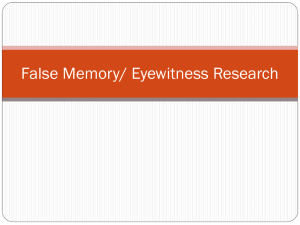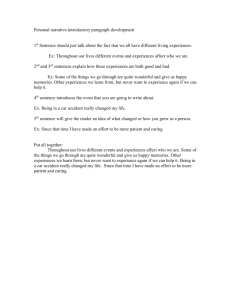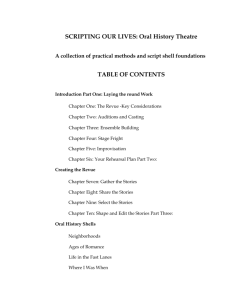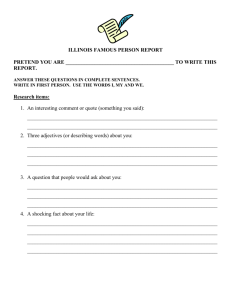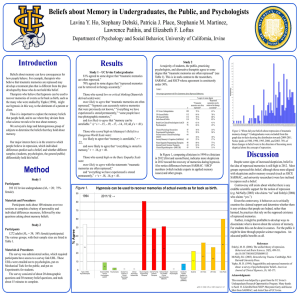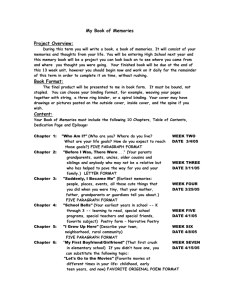The Admissibility of Repressed and Recovered Memories of
advertisement
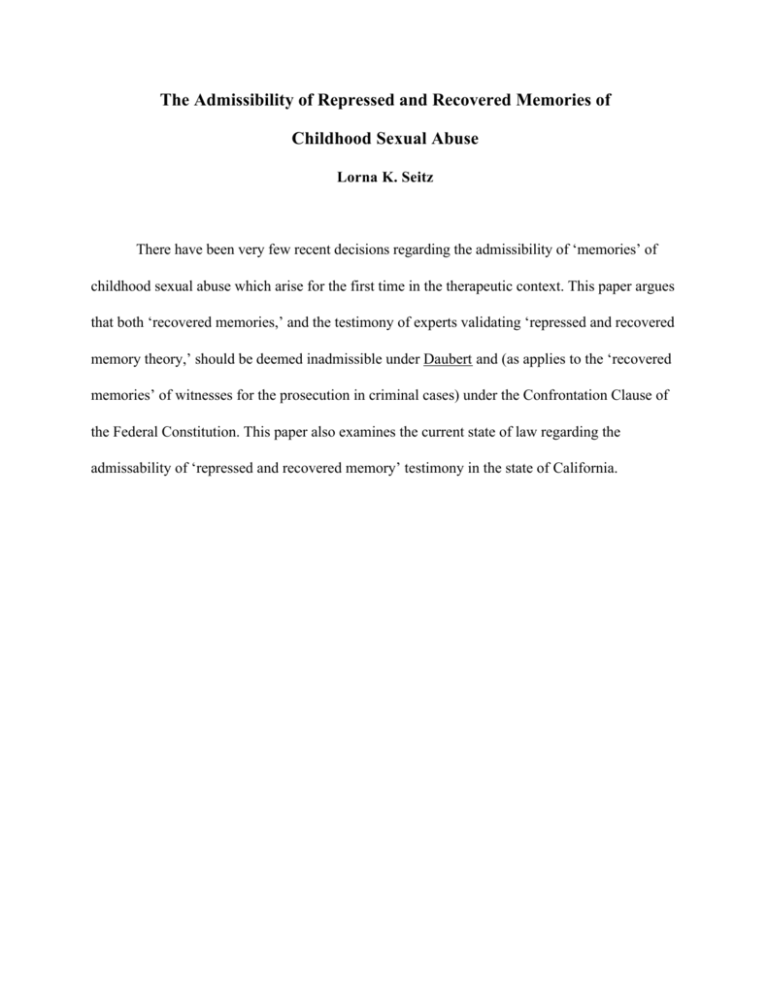
The Admissibility of Repressed and Recovered Memories of Childhood Sexual Abuse Lorna K. Seitz There have been very few recent decisions regarding the admissibility of ‘memories’ of childhood sexual abuse which arise for the first time in the therapeutic context. This paper argues that both ‘recovered memories,’ and the testimony of experts validating ‘repressed and recovered memory theory,’ should be deemed inadmissible under Daubert and (as applies to the ‘recovered memories’ of witnesses for the prosecution in criminal cases) under the Confrontation Clause of the Federal Constitution. This paper also examines the current state of law regarding the admissability of ‘repressed and recovered memory’ testimony in the state of California. History The validity of eyewitness testimony has long been an issue of concern for courts. The plethora of laws regulating the admission of hearsay, requiring first hand knowledge and allowing liberal cross examination of witnesses attempt to test the accuracy of a declarant’s perception and memory of events, as well as his/her sincerity. Cases where a witness cannot remember events without first having his/her memory refreshed are of special concern to the courts. The act of refreshing a witness’s memory introduces the possibility for corruption of that memory. If a witness is particularly suggestible, he may wholly adopt the account of events which is presented to him. (See: Mazzoni, Loftus, Seitz and Lynn, Changing beliefs and memories through dream interpretation, 13 App. Cog. Psych 125-144 (1999).) Other witnesses may subconsciously intertwine details from suggested scenarios, and other life experiences, into their memories of a specific event. (See: Ayers & Reder, A theoretical review of the misinformation effect, 5 Psych. Bull. & Rev. 1-21 (1998).) Research suggests that most memories undergo a constant process of alteration over time as the brain fills in gaps in memory by accessing other memories. (See: Stone (Ed.), The Science of Self Report, Lawrence Erlbane Assoc., New Jersey (2000).) That confabulation, gap-filling, and other natural processes prevent us from accurately recalling events is of utmost importance when parents, grandparents, or family friends are criminally convicted for abusing young children on the basis of long- ‘suppressed,’ and allegedly ‘recovered,’ memories. The sexual abuse of children by friends and family members not only happens, but it afflicted an estimated 141,690 American children in 1994 alone. (Child 2 Maltreatment 1994: Reports from the States to the National Center on Child Abuse and Neglect (1996).) Child sex abuse is a real world problem, and its prevention is a major public policy objective. However, there are few contexts in which false ‘memories’ are so likely to arise. Part of the difficulty in verifying post hoc ‘memories’ of childhood sexual abuse arises from the fact that there is likely to be no corroborating evidence by the time the memory ‘re-surfaces.’ Another problem is simply that, because childhood sexual abuse is such a common phenomena, a therapist is likely to consider past abuse as a possible cause of his/her patients’ bulimia, depression, etc. (Hochman, Recovered memory and false memory syndrome, 2 Skeptic 58-64 (1994).) Though childhood sexual abuse is not the sole cause of these adult maladies, therapists who have treated abused children, or who are themselves abuse survivors, often pursue suggestive lines of questioning. (Id.) The underlying trauma that led the patient to initially seek counseling, and the fact that the patient seeks counseling precisely because he/she hopes that a therapist’s intervention will bring an end to his/her bulimia, depression, or other malady, makes a psychiatric patient intrinsically vulnerable to suggestive influences. (Id., Laura Pasley’s Story.) Several psychiatric techniques, such as guided imagery, greatly diminish the reliability of memories that arise in the therapeutic context. (Stone, pgs. 201-211.) Are Experts on Memory Repression and Recovery Helpful to the Trier of Fact in Understanding the Issue? Under the California Evidence Code, opinion testimony by an expert witness is only admissible if it is “related to a subject that is sufficiently beyond common experience” such that 3 the expert’s opinion “would assist the trier of fact.” (Cal.Evid. Code § 801) ‘Recovered memories’ are often disjoint and seemingly implausible. (B.A. Van der Kolk & R. Fisher, Dissociation and the fragmentary nature of traumatic memories, 8 J. Traumatic Stress 505 (1995).) One of the roles of the plaintiff’s expert is to convince the jury that the fragmented, bizarre nature of plaintiff’s memories should not be taken as a sign that plaintiff’s memories are false. Plaintiff’s expert will argue that trauma victims may experience a ‘fragmenting of the brain,’ and that this fragmenting process deprives a trauma victim of the ability to describe his memory in the form of a coherent visual narrative. (Id.) This testimony is necessary in order to combat the juror’s expectation, based on his own experience, that ‘real’ memories can be explained as coherent visual narratives. The average juror should not be presumed to have experienced traumainduced memory fragmentation. In a case where an adult plaintiff alleges that he was a victim of childhood sexual abuse, his ‘memories’ may be the only evidence that the alleged childhood sexual abuse took place. Expert testimony as to the nature of ‘recovered’ memories is necessary to the abuse victim’s case. However, a California court must be satisfied that an expert has based his/her opinion upon special knowledge or experience of a type that may be reasonably relied upon in forming an opinion (Cal. Evid. Code §801(b).) before the court will allow testimony that childhood sexual abuse can cause memory fragmentation and repression. The expert advocating ‘repressed/recovered memory theory’ will stress that the DSM-IV recognizes the existence of posttraumatic stress disorder, dissociative amnesia, and dissociative identity disorder--all of which are terms describing the fragmentation of memory due to traumatic experience. (Diagnostic 4 & Statistical Manual of Mental Disorders § 300.12, at 478-81, § 309.81, at 424-29, § 300.14, at 487 (4th ed. 1994). Plaintiff’s counsel will stress that the DSM-IV is a widely used manual, with high credibility, in the therapeutic community. Plaintiff’s counsel will further suggest that it is reasonable for an expert in the field of psychiatry to conclude, on the basis of patient’s fragmented memories of childhood sexual abuse and the DSM-IV’s recognition that memory fragmentation and repression are possible, that childhood sexual abuse can lead to memory fragmentation and repression. The problem with plaintiff’s analysis is that the DSM-IV simply attaches diagnostic labels to sets of symptoms that are observed together in a significant number of patients. The DSM-IV diagnostic categories are not based on physiological evidence that repression is possible, or that traumatic events can induce memory fragmentation, they are simply a set of labels to convey that numerous individuals manifest a set of symptoms. The DSM-IV was not written in order to demonstrate that traumatic incidents cause memory fragmentation and/or repression but, rather, it was written to help therapists recognize symptomatic patterns to aid in devising treatments for individual patients. A clinical psychologist could claim that his/her experiences helping patients to recover repressed memories constitute experiences of a type which could be “reasonably relied on to form an opinion” (Cal. Evid. Code §801(b).) that childhood sexual abuse causes memory fragmentation and repression. However, a psychologist’s experiences recovering ‘repressed’ memories of abuse from patients would only be probative on the issue of whether childhood sexual abuse causes memory fragmentation or repression if the alleged instances of childhood 5 sexual abuse were independently corroborated. Furthermore, even if a psychologist repeatedly heard incoherent accounts of childhood sexual abuse from documented abuse victims, such an observation could not reasonably give rise to the inference that the memories were partially repressed, or that the lost memory fragments could be recovered in therapy. It should be necessary to establish that memory fragmentation and repression are physiologically possible before an expert is allowed to postulate that a witness’s incoherence could be resulting from a ‘repressed’ memory. At present, there is no evidence that memories can be ‘repressed.’ Memories which are based upon disjoint perceptions of events, and memories which have degraded over time, will both be fragmented and incoherent. There is no reason to believe that a fragmented, incoherent memory was initially perceived as a coherent narrative. Likewise, there is no reason to believe that forgotten memory fragments have been preserved, intact, and are available for ‘recovery’ during therapy. Is Memory Recovery A “New Scientific Technique” Such That It Is Subject To Kelley Review? California has explicitly reaffirmed that the Kelly-Frye rule, and not Daubert, remains its standard. (People v. Leahy, 882 P.2d 321 (1994).) Under Kelly, only a “new scientific technique” needs to have gained “general acceptance in the particular field to which it belongs.” (People v. Kelly, 549 P.2d 1240 (1976)) California courts have concluded that forensicpsychological interviews conducted under the drug sodium amytal (Ramona v. Ramona, 57 Ca.App.4th 107 (1997)) involve a “new scientific technique,” but it is unclear whether the courts would hold that psychiatric interviews conducted with a therapeutic technique such as “guided 6 imagery” would, likewise, be subject to review under Kelly. There would be no such difficulty under the Daubert-Kumho Tire standard. Under Kumho Tire, the Daubert analysis applies to all expert testimony, not just to the limited category of expert testimony relating to “new scientific techniques.” (Kumho Tire Company v. Patrick Carmichael, 1999 WL 152455 (S.Ct.); Daubert v. Merrell-Dow Pharmaceuticals, Inc., 509 U.S. 579 (1993).) A federal court would directly address the question of whether expert testimony as to ‘repressed’ and ‘recovered’ memory theories is reliable. How Appropriate is Daubert for Determining the Relevance and Reliability of “Expertise” from the Behavioral Sciences? In deciding whether it is appropriate to apply Daubert to the behavioral sciences, it is important to consider whether the factors that support baring unreliable scientific and expert proof from court apply. Human behavior, unlike most subjects of scientific and expert elucidation, is within the realm of an average juror’s everyday experience. Though a juror may require reassurances that abnormal behaviors are common among certain groups, and their presence in a given witness does not imply that he/she is lying, (People v. Harlan, 222 Cal.App.3dd 439, 448 (1990)) jurors are probably more capable of understanding the explanations of psychiatrists and sociologists, and of critically evaluating their theories, than they are of independently evaluating the theories of other experts. A heightened ability among jurors to critically evaluate theories from the behavioral sciences would reduce concerns that those jurors would uncritically defer to the opinion of experts and, thereby, would reduce the need for judges to keep unreliable theories away from the jury. 7 Daubert does suggest that courts should undertake a flexible approach in analyzing whether or not the proffered scientific evidence is ‘reliable.’ The “four factors” which the Daubert decision sets forth to help courts analyze the reliability of a scientific method are not necessarily the only, or even appropriate, factors to be considered in any given case. Daubert asks whether the scientific method is falsifiable, peer reviewed, generally accepted and whether its known/potential error rate has been ascertained. Proponents of ‘repressed memory’ theory often argue that the Daubert factors are not well suited to determining the reliability of theories and methods used by behavioral scientists. In State v. Quattrocchi, the state argued that the application of Daubert criteria to the behavioral sciences should be relaxed because behavioral issues are not easily studied in laboratories, making it difficult to verify the accuracy or falsehood of individual recovered memories in order to determine the overall “error-rate” associated with the recovery of repressed memories. (State v. Quattrocchi, 1999 WL 284882 (R.I. Super.).) Though it is easier to determine error rates in the physical sciences, psychological research has been conducted which provides some sense of the potential for ‘false memories’ to be recovered under various clinical conditions. Studies have shown that people are highly suggestible to false statements by family members than an event took place (Loftus & Pickrell, 1995; Hyman, Husband & Billings, 1995; Human & Pentland, 1996; Cici, Loftus, Leichtman & Brucke, 1994). Furthermore, hundreds of published experiments document that exposure to misinformation distorts memory (see: Ayers & Reder, 1998 for a summary of such research). In the usual course of conducting a therapy session, a therapist must ask questions. One study found that 12% of subjects who were simply asked 8 whether or not an event had taken place changed their minds between the first and second questioning. (Garry, Manning, Loftus & Sherman, 1996). Therapeutic techniques in widespread use, such as ‘guided imagery’ and encouraging patients to allow their imaginations to run wild, are likely to generate a particularly high rate of false memories. In one study, a minute long ‘guided imagery’ session succeeded in convincing 24% of the subjects that an event had occurred during childhood. (Garry, Manning, Loftus & Sherman, 1996). Though the rate of successfully implanting false memories in a research setting is likely to differ from the same technique’s implantation rate in a therapeutic setting, it is likely that false memories will be more easily induced in the therapeutic setting due to the vulnerable state of therapy patients and due to the trusting relationship that hopefully develops between therapist and patient. Significant numbers of practicing psychologists encourage their patients to be imaginative in therapy. In one survey, 22% of the responding psychologists admitted to encouraging their patients to “give free rein to the imagination.” (Poole, Lindsay, Memon & Bull, 1995, pg. 432.) When a psychiatric patient engages in imaginative exercises in the course of therapy, and the patient imagines events which are remote in time, the patient runs a substantial risk of becoming convinced that the imagined events occurred in fact. (Garry, Manning, Loftus & Sherman, 1996). In Daubert, the Supreme Court notes that peer review is a component of good science because “it increases the likelihood that substantive flaws in methodology will be detected.” (Daubert, 509 U.S. at 593.) Though peer review may not be an available means by which to analyze the validity and reliability of therapeutic techniques generally, the level of publication 9 and peer review on repressed memory recovery is high. The fact that ‘repressed memory’ and ‘memory recovery’ have been thought interesting and credible enough to merit publication is undermined by the intensely negative response which these theories have prompted from the relevant scientific community. The debate over the methods used to recover repressed memories, and the meaning of the results of various studies, are hotly debated. (See: Hungerford, 697 A.2d at 925.) California has not adopted Daubert. In general, California still applies Frye. However, the remaining criterion to be evaluated under Daubert, the question of the degree to which a theory has received general acceptance within the relevant scientific community, represents a continuation of the old Frye test. Were California courts to consider the theories of memory repression and recovery new scientific ‘techniques,’ and, hence, subject to analysis under the Kelly-Frye test, they would undertake a ‘general acceptance’ inquiry. As shown above, the theory that human beings can repress, dissociate, and later recover memories of traumatic events with a predictable degree of accuracy is “completely controversial and unsupported.” (Elizabeth Loftus, Ph.D Professor of Psychology at the University of Washington quoted in Quattrocchi). Are Courts Ruling Repressed Memory Evidence Admissible Under Daubert? Courts that have addressed the question of the admissibility of repressed memory evidence under the Daubert standard are divided. The Eastern District of Michigan held that repressed memory is sufficiently reliable to be admissible under Daubert (Isley v. Capuchin Province, 877 F.Supp. 1055 (1995)), but the New Hampshire Supreme Court held that recovered repressed memory testimony fails to meet the Daubert reliability standard. (State v. Hungerford, 10 697 A.2d 916 (N.H. 1997)). Though Rhode Island courts still follow the Frye standard, a Rhode Island Superior Court joined the New Hampshire Supreme Court in holding repressed and recovered memory testimony inadmissable. (State v. Quattrocchi, 1999 WL 284882 (R.I. 1999).) Thus far, no California courts have addressed the question of whether an expert can testify as to ‘repressed memory’ theory, or whether memories of childhood sexual abuse ‘recovered’ by the alleged victim during therapy are admissible. The California Court of Appeal has barred a plaintiff from testifying as to childhood sexual abuse when her ‘memory’ of being abused arose during a psychiatric interview under the influence of sodium amytal. (Ramona v. Ramona, 57 Cal.App.4th 107 (1997).) Though the Ramona decision could logically be extended to bar all ‘repressed memory’ testimony when memory recovery was responsive to third party suggestion, it is probable that California courts will not consider the memory recovery techniques used in day-to-day therapy as “new scientific techniques” subject to review under the Kelly(Frye) test. In Criminal Cases, does the Admission of “Repressed and Recovered Memory” Evidence from Prosecutorial Witnesses Violate the Confrontation Clause? Even if California refuses to analyze counseling techniques such as guided imagery under the ‘scientific evidence’ rubric, California courts could still find evidence of a plaintiff’s ‘repressed and recovered’ memories inadmissible in criminal prosecutions due to the Sixth Amendment of the Federal Constitution. Though the Supreme Court has held that the Confrontation Clause (U.S.C.A. Const.Amend. 6) only guarantees an “opportunity for effective cross-examination,” (Delaware v. Fensterer, 474 U.S. 15, 22 (1985)) the Court did leave open the 11 possibility that there may be “circumstances in which a witness’ lapse of memory may so frustrate any opportunity for cross examination that the admission of the witness’ direct testimony violates the Confrontation Clause.” (Id. at 20). Therapeutically ‘recovered’ ‘repressed memories’ should be viewed as analogous to hypnotically induced ‘memories.’ Courts have long seen difficulties with admitting ‘memories’ recovered through hypnosis due to the objective unreliability, and to the subject’s heightened confidence in the veracity of, hypnotically refreshed memories. (See: People v. Hughes, 453 N.E.2d 484 (1983); Rock v. Arkansas, 483 U.S. 44 (1987).) All ‘recovered memories’ stand a high likelihood of being inaccurate. ‘Memories’ that are recovered in the course of therapy are the statements of individuals who are in such severe psychological pain that they have sought the guidance and reassurance of therapists to help them understand the underlying roots of their torment. ‘Memories’ recovered in this context are likely to become ingrained and to instill confidence in their accuracy, whether they are true or false. In the case of all ‘repressed and recovered memories,’ the patient has no means of gauging the reliability of his/her memory other than by the reaction of others to it, and his/her confidence in the reliability of the technique which elicited the memory. The issue of the admissibility of the ‘recovered’ memories of a prosecutorial witness in a criminal action has been left open by the Supreme Court. The problems with effectively crossexamining an individual who claims to have a ‘recovered memory,’ the impossibility of ascertaining the truth or falsehood of a ‘recovered memory,’ and the witness’s artificially increased confidence in the truth of the memory, all indicate that ‘recovered memories’ should fall 12 under the category of “circumstances in which a witness’s lapse of memory may so frustrate any opportunity for cross examination that the admission of the witness’ direct testimony violates the Confrontation Clause.” (Delaware v. Fensterer, 474 U.S. at 20) The ‘recovered memories’ of a prosecutorial witnesses in a criminal action should be deemed inadmissible, as violative of the Sixth Amendment. 13
